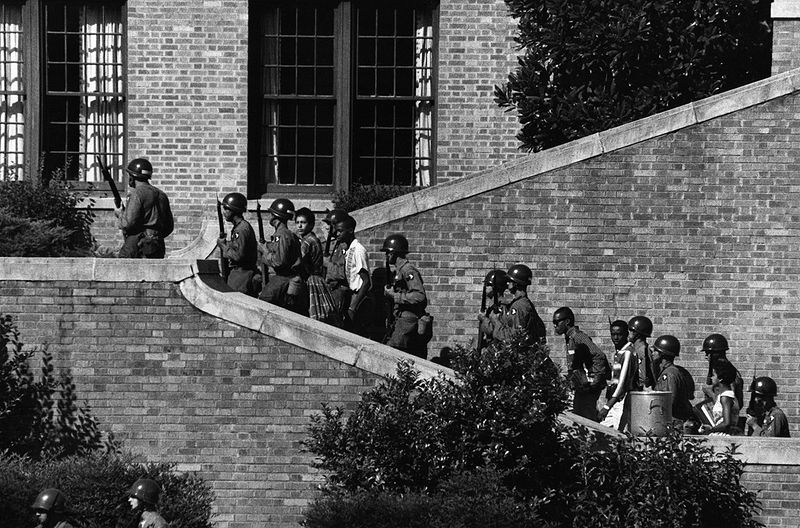 “That crucible moment” – that’s a phrase Ernest Green used to describe the period when he and eight other African American students enrolled in and attended Little Rock Center High School in 1957. It took the president of the United States and 10,000 soldiers to help them get in the door in deeply segregationist Arkansas. But more than anything, their success took the determination and self-control that the nine showed against almost overwhelming opposition and hate. The events of that fall became a huge landmark in the fight to end official segregation.
“That crucible moment” – that’s a phrase Ernest Green used to describe the period when he and eight other African American students enrolled in and attended Little Rock Center High School in 1957. It took the president of the United States and 10,000 soldiers to help them get in the door in deeply segregationist Arkansas. But more than anything, their success took the determination and self-control that the nine showed against almost overwhelming opposition and hate. The events of that fall became a huge landmark in the fight to end official segregation.
I didn’t expect to be as moved as I was when six of the nine took the stage at the Varsity Theater this week to receive Marquette’s highest honor, the Pere Marquette Discovery Award, from Father Robert Wild, S.J., the university’s president.
Maybe it was because I was just barely old enough at the time – I was seven – to have the television images from Little Rock permanently planted in my mind. And here they were, in person.
Or maybe it was how their presence inevitably made the 1,000 or so in the audience focus on the sweep of all that has happened since those days, on all that has been accomplished and all that has not. We live in a time when no one could envision black high schoolers being treated with such official or unofficial hostility any more, just for wanting to enroll in a school. But we live in a time when actual equality in educational access and success remains far more distant than anyone with any civil rights sentiment in 1957 could have imagined.
Or maybe it was just the six award recipients themselves — now generally in their late 60s, they were dignified, gracious, and good natured in talking about the events of 52 years ago. They carried themselves the way you would hope living legends would. They talked about how they never wavered in their commitment to going through with enrolling in Little Rock Central because they simply wanted a good education and knew they were entitled to be in that school. As for those who acted toward them with malice, “they threw their dignity away and, guess what? It landed on us,” said Mannijean Brown Trickey.
The Law School’s Mike Gousha, moderator of the hour-long conversation with the six, asked them what their thoughts were on the achievement gaps and other issues that still exist in education.
Trickey said people need to look at the societal issues that still shape lives and make America a fragmented society, such as the legacy of centuries of mis-education or no education for African Americans. The have-nots still get less when it comes to resources, power, and the factors that give children strong starts in education.
Carlotta Walls LaNier said her thinking returns to the basics. “We need to revisit the fundamentals of families and put the emphasis back on education being the number one priority for your children,” she said. “We need to bring it back to where it belongs, and that is in the home.” The Little Rock Nine were each young people who wanted to learn and who had strong support from their families to succeed in school. Expectations were high.
Green said he hoped that accepting the award would be a way for the six who came to Milwaukee to inspire some young people, to convince them “that they can get more out of life than perhaps what they’re doing now.” He added, “I’m an optimist that the best is in front of us.”
Little Rock Central itself was rated in the most recent Newsweek magazine list as the thirty-sixth-best high school in America. Elizabeth Eckford said that the success at her old school is praiseworthy, but she said it is also a very distressed school if you look at how some students are doing.
What emerged from that crucible of Little Rock in 1957? For the individuals of the Little Rock Nine, good things. Many have college degrees and have had distinguished careers, and their warmth and wisdom were clearly evident at the Varsity Theater.
And for the nation? To pick up on Green’s optimism, maybe the best thing to say is that the crucible shaped a very important set of changes, but the final product is not yet fully formed.

I applaud Marquette for recognizing the heroism of the Little Rock 9. However, we should remember that they were the shock troops in a campaign to integrate southern public schools that went on for another decade and a half.
It was not until the early 1970’s that most parts of the South saw meaningful integration of the public schools.
The Little Rock story was an important part of the integration story, but it was not necessarily a great victory. Reading the biographical profiles in the program distributed at the ceremony, it was sobering to see how few of the nine were able to finish their high school educations in Arkansas, let alone Little Rock.